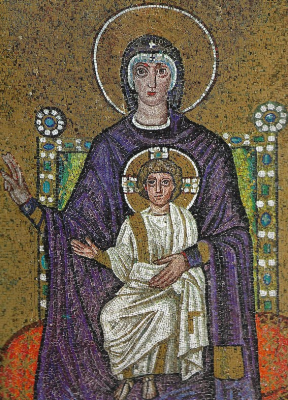The O Antiphons: O Rex Gentium, O Emmanuel

Theotokos, Basilica St'Apollinare Nuovo, Ravenna. Wiki image.
22 December: O Rex Gentium. 23 December: O Emmanuel
22 December: O Rex Gentium
O king of the nations, and their desire,
the cornerstone making both one:
Come and save the human race,
which you have fashioned from clay.
There is something interesting about the type of King in this antiphon, three main points perhaps? The first takes us deep into the prophecies of the Hebrew Scriptures, those oracles of God uttered in His name deep in the ancestral history of faith. Isaiah pulls together nearly all of the images given us in the text, the unfold I several passages but we firstly remind ourselves that unlike many earthly potentates throughout the centuries; this King is definitively connected to God and reigns as God's representative,
'For the people that walked in darkness now see a great light'(Is 9.2) and will know joy and rejoicing at the destruction of cruelty and evil. 'For to us a child is born, to us a son is given, and the government will be on his shoulders. And he will be called 'Wonderful Counsellor, Mighty God, Everlasting Father, the Prince of Peace.' (Is 9.6) Part of his role is to bring things together so that there is peace, but it is also to turn the worlds values upside down.
Christ's reign is the reconciliation of opposites where the innocent, unnoticed, unheard ones have the voice of God, where human and animal are at one with each other and all creation is somehow connected together in wonder and harmony. That is the handiwork of the divine potter who metaphorically gets his hands dirty in clay to fashion all life and see it as beautiful, this is a King who creates not destroys!
Is this fanciful, will this ever happen? The first coming of Christ is a marker that it eventually will, for salvation is now our song! Jesus, the King of the nations points out the route we are called to, the people of light who prepare the way for the great day of his return!
In the New Testament, there are wonderful theological analogies about the body of Christ; here we have the building metaphor, the cornerstone of our living building is Christ. It took me a while to recognize that the cornerstone is not only a marker, but in fact the reference point for the whole design! The writer of Ephesians 2.20 makes it clear that for us this building is faith, and it is only on Christ we build our lives ! He becomes our reference point for all we do! So let's help beat swords into ploughshares, turn spears into pruning forks so that we may plant, grow and harvest Christ's peace amongst the nations, not in the future, but now!
23 December: O Emmanuel
O Emmanuel, our king and lawgiver, the hope of the nations and their saviour: Come and save us, O Lord our God.
Do you take the trouble to read and explore what is being said in Scripture? There are contexts to be investigated, particularly in sections that have clear historical origins, such as Isaiah's utterances for us in this last week of Advent. We need to engage more, so that the word of God comes alive in us. We study the Scriptures but we also pray them, engage in what the monks called lectio divina so that the Holy Spirit may open for us the treasures of the teaching of the Lord Jesus through our Gospels and other writings.
That's what our Great 'O' Antiphons do. They weave poetry, symbols, scripture, and theology all together so that we glimpse the unfolding of belief in the risen presence of Jesus, God who is always with us, the true Emmanuel!
There are two prophecies of Isaiah that link into this 'O' Antiphon. One poetically describes what is to come: 'The Lord himself will give you a sign: the virgin will conceive and give birth to a son and will call him Immanuel' (Is 7.14) Some people have quibbled about what this might actually mean, but we don't use this as a 'proof text', it belongs to the revelation of faith, those times when the obscure, cloudy, utterances of humans are filled with the clear light of the Most High, where in the words of St Luke, 'nothing is impossible for God!
The second passage reveals a context, and the meaning of the name Emmanuel: 'God is with us'. (Is 8.8) Initially this is about trouble with the Assyrians, who are going to terrorise the people of Judah . Isaiah warns in unequivocal terms; 'enemy soldiers will cover Judah like a flood reaching up to your neck', but then gives a signal that all is not lost, far from it: 'But God is with us. He will spread his wings and protect our land'. (Is 8.8) To the enemies he says, 'you will fail because God is with us'.(Is 8.10)
In Isaiah's quotes I find great hope, that from the dawn of time right up to Bethlehem and the nativity of Jesus and beyond to our own day, in times of oppression and of joy, God has been with us, and in the person of Jesus Christ really came to be one of us.
O Emmanuel, be with all peoples, draw them ever closer to your abiding presence that they may find salvation and see the joy of their hope in you fulfilled.


















